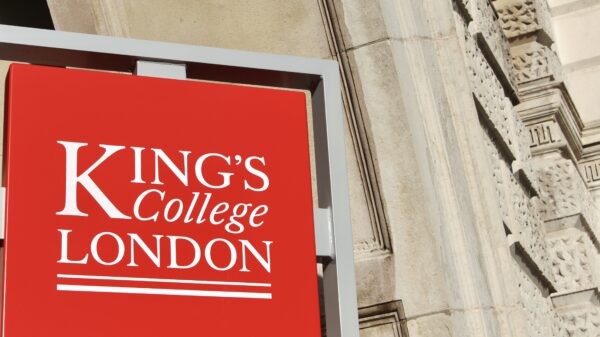Culture Editor Keir Holmes interviews Will Davies, dramaturg for King’s College London’s 69th annual Greek play, which will reimagine the Theban plays for a contemporary audience.
“The Plague at Thebes” is the name of a new work based on “Oedipus Rex” and “Antigone” at the Greenwood Theatre that was made entirely by King’s College London (KCL) students. Directed by Oliver Graham, this project is part of a long line of plays performed partially or entirely in Ancient Greek at KCL, a tradition that began at the university in 1953.
Here at Roar, we were given an opportunity to interview the dramaturg supervising this production a few days before its first performance on 22 June.
Roar: It’s good to meet you, Will. Could you start by explaining what a dramaturg does?
WD: As far as roles in theatre go, dramaturgs are fairly novel. Essentially, what a dramaturg does depends on what country you’re in. In this country, they sort of take the role of a literary manager. They take charge of the script, not only making sure that it works practically so that people can use it to perform, but also ensuring that it works thematically.
My role in this project is mostly to do with that second part at this point. So, I have made sure that all of the thematic devices work and that everything fits in with the themes of the play. Part of that involves working with the design and set team so that what they are doing matches what is going on in the script.
Also, because this is the King’s Greek Play, I’ve had to make sure that all the Ancient Greek works too, so it’s lucky that I’m a Classics student. I’m in my third year doing Greek and Latin, which has really allowed me to help out with that part.
It involves a lot of working with the text. It’s not the most well-defined role, unlike the director, but, hopefully, that gives you some idea about what I do.
R: So, would you say that this project used a more collaborative method of devising theatre instead of the usual director-led approach?
WD: I’d say so, yeah. Everyone had their own input. There was never, at any point, any one person in charge, which I’m always a fan of. I think that if you only get one person in charge, you tend to get sidetracked with their individual ideas. This project really hasn’t had that. It’s been collaborative the whole way through. I think that this is such a fun and healthy way to work, and that this project is a lot better for it.
R: Keeping on that theme of breaking from traditional methods, this production is different from a lot of the previous Greek plays at KCL. Up until recent times, the King’s Greek Play has been a straight production of an Ancient Greek play, but on the website for this project, it says that you’ve reworked the Theban plays for the contemporary moment. What motivated this change?
WD: Firstly, there’s a pragmatic reason. Using a lot of Ancient Greek requires a lot of surtitle work, which forces an audience to essentially read an entire play while watching a performance. It isn’t the most user-friendly option at times.
On a creative level, I’d say that we are reaching a point in Classics where things are being re-examined. There are a lot of contemporary societies and organisations such as Trans in Classics, Queer and the Classical, and London Classicists of Colour, which I’m a committee member for, all of which are re-examining ancient texts that have previously been limited to the upper classes. One part of this has been about taking away the exclusivity that has been given to the Classics, and another part has been about letting people use these texts to tell their own stories.
There are about thirty Ancient Greek tragedies left, and every one of them speaks to one individual issue above all. “Oedipus Rex” is a story that takes place in the midst of a terrible economic and social situation as well as a plague, and “Antigone” is about a civil war. These issues are all universal, particularly the plague one. I don’t think that I need to elaborate on why that one is relevant. So, you can look at these issues through a modern lens and get a lot from them by doing so. If you’re doing it all in Ancient Greek, you’re going to miss out on some level.
But, equally, we do have a lot of Ancient Greek in this play. It’s fun, no one else does it, and, most importantly for me, it allows us to contrast the Ancient Greek language and its more rigid, ancient forms with what we’re writing. I won’t spoil anything, but there’s a lot of contrast between the English and Ancient Greek scenes. Not only in the language but also in the themes discussed and the story presented. We’re definitely playing on that change of language.

Some of the cast and crew for “The Plague at Thebes”. Image provided by Angelica Baker Ottaway.
R: I was going to ask, how was it using Ancient Greek when you were writing? Describe your process.
WD: Don’t write in Ancient Greek. It’s really, really difficult. Ancient Greek as a language is about twice as dense as English, which is not fun. All of the Ancient Greek used in the play is from Sophocles. We have transliterated it, making it easier to read. So, it’s not written in the Greek text, but it is in the Greek language. That’s what you will be hearing the performers perform.
When writing in English, we used a very collaborative process. We spent a good few months deciding on what we wanted to talk about and where we were going to take this story. Initially, we had all of “Oedipus Rex” in Greek and, now and again, we’d have a scene where Antigone would interrupt this narrative with some reflections on her own life. But, as we wrote more and more, we realised that Antigone’s story was something that we really wanted to tell. So, now we have a play in which all of the English scenes are Antigone’s, and the scenes in which she’s looking back at her past are the ones that are in Ancient Greek.
I could tell you about all of the story decisions we’ve made, but I don’t want to spoil anything. All I will say is that we’ve spent a good few months working on the English stuff, and that we’ve refined it into something that I believe is really quite important and potent for a modern audience. It’s about overcoming authoritarianism, overcoming tyranny, and dealing with the fact that things don’t always go perfectly.
I don’t know how much your readers know about “Antigone”, but it’s an Ancient Greek tragedy. It’s not a happy play. We’ve tried to put some positive spin on that, and I believe that we’ve succeeded in creating some sense of hope for the future, even if the play might have a sad ending for the character.
R: You’ve spoken a lot about how ancient texts interact with the present. So, I was wondering, what was it exactly that drew you towards these classical texts in the first place?
WD: I was lucky. I did go to state schools, but I had the opportunity to do a Latin GCSE. It all started from there for me. I’m a straight Classics student, which means that I do Classics alongside the languages, Greek and Latin. A lot of people do Classics Studies which is a more general degree, it includes Literature, History, Languages, and a whole lot of other stuff, but I’ve always loved the languages. I always found it interesting. It’s quite a bit like a puzzle. People say that Latin is a lot like maths, and there is some truth in that.
What draws me to the Classics the most is that it’s a collection of all of the Humanities. Every single one is covered, History, Literature, etc. It’s all localised into this area of history which is unimaginably broad. Classics cover everything from around 4000-5000 BCE to the fall of the Byzantine Empire at about 1450 AD.
Also, it’s not just centred in Greece and Europe, it focuses on more or less the entire world, so you get a wealth of stories, literature, and history, all of which can be applied in some way to modern life. Especially now that we’re in an age of rediscovery for the Classics, I see that people are looking at the subject in a way that people haven’t since these texts were first written. I love being a part of that, being able to look at ancient literature, and then being able to suggest that people were wrong, that maybe these texts meant something else way back then. That’s what we’re doing with this play.
R: Do you have anything else that you would like to say about the play before the end of this interview?
WD: It’s fun, it’s genuinely enjoyable, and, I’ll say this one thousand times because it hasn’t been said enough, the cast and crew have worked so hard on this. They have done so well. There was a time when Ancient Greek was an entirely new language to all of them, and now they’re performing entire scenes from memory in a language that they don’t even speak. It’s magical. I can’t heap on the praise enough for this cast.
It’s been a difficult project with COVID, with the strikes, and with a bunch of restrictions, and projects like this are always complicated to run anyway. We’ve had more than a fair share of setbacks. Regardless, it’s the final week, they’re in the other room rehearsing right now as we speak, and it could not be better.
“The Plague at Thebes” is playing at the Greenwood Theatre from 22 June to 24 June. You can book tickets here.
Former Culture Editor for Roar News.

















